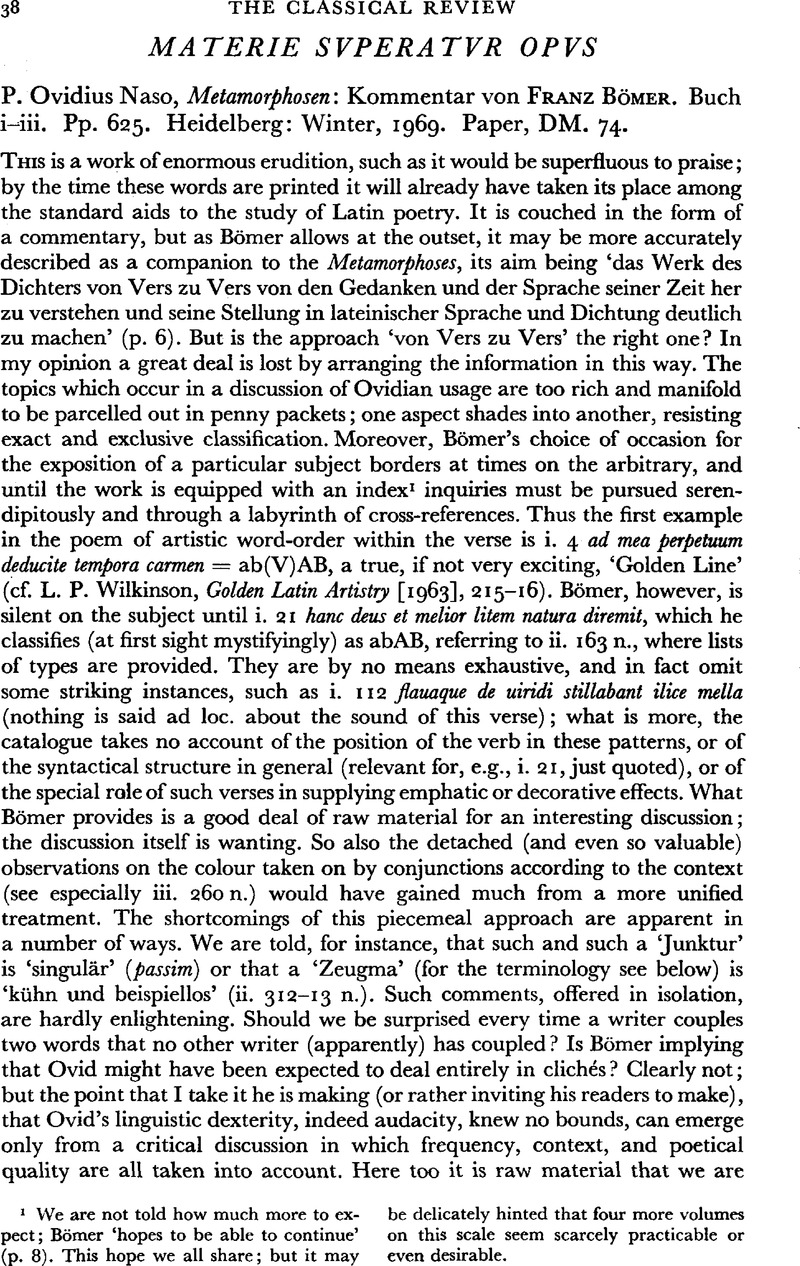Published online by Cambridge University Press: 27 February 2009

page 38 note 1 We are not told how much more to expect; Bömer ‘hopes to be able to continue’ (p. 8). This hope we all share; but it may be delicately hinted that four more volumes on this scale seem scarcely practicable or even desirable.
page 39 note 1 Cf. Postgate, Proc. Brit. Acad. iii (1908), 167.1 will take this opportunity of remarking on a certain insularity in Bömer's scholarship. He makes no mention of D. A. Slater, Towards a Text of the Metamorphosis of Ovid (1927), and appears to be unaware of the existence of G. M. Edwards's text of Met. in Postgate's Corpus, which was much more sensibly edited than that of Merkel–Ehwald. The categorical rigidity of which I complain might have been mitigated by study of A. J. Bell's The Latin Dual and Poetic Diction (1923); it must be used with caution, as all who open it soon discover, but it is based directly on the texts, not on what modern grammarians say about them, and it recognizes the fluidity and complexity of poetical syntax. The same is true of a much greater book, James Henry's Aeneidea, perusal of which might have led Bömer to comment on a very characteristic feature of Ovid's style, theme and variation: see, for instance, the notes that he has not written on i. 85–6, 272–3, 488–9, ii. 72–5, etc.; also (variation and theme) i. 433, where all we hear is of ‘fast tautologische Wiederholung des vorhergehenden Gedankens’. At iii. 125 a reference to Pearce's useful articles on enclosing word-order in C.Q. lx (1966), as well as to (e.g.) Met. i. 112, would have been helpful. Study of J. A. Richmond's edition of Halieutica might have induced Bömer to desist from quoting this poem as if its usage proved anything about Ovid's (ii. 400, 716 nn.). Conversely Jackson Knight's largely negligible piece in Ovidiana is freely cited; and space for which better use could have been found is occupied by a superfluous refutation of Owen (iii. 264 n.).
page 40 note 1 instabiles nimia Imitate feruntur: ‘eine Verbindung nach der einen … oder der anderen … Seite kann nicht mit Sicherheit bewiesen werden.’ Of course not; but that is no way to write about poetical syntax.
page 40 note 2 Housman's is another name that one rarely encounters in these pages. The note on ii. 33, for instance, should have referred in the first place, not to Marouzeau, but to Haupt, Opuscula, iii. 510–12, and to Housman, C.R. xi (1897), 426. I have made this point before (C.R. lxxix [1965], 320), and I shall be surprised if I do not have to make it again.
page 40 note 3 For the Latin poets see W. V. Clausen on Persius 1. 131, and cf. C.Q. lii (1958), 55. In Greek see (e.g.) Aesch. P. V. 653, Ag. 656; Soph. El. 193, O.T. 734, 761, 1205, Ant. 367; Eur. Alc. 114–15, Ph. 284, I.A. 210; Ar. Av. 740; Callim. fr. 714. 3 and Pfeiffer's note; and cf. Wilamowitz on Eur. Her. 237, G. Kiefner. Die Versparung (1964)‘ pp. 27–9.
page 40 note 4 Bömer, in arguing for adductas, adduces a parallel which (apparently) purports to show that the god saddled and bridled his herd.
page 41 note 1 The discussion of the Doppelfassung at 544 ff. (pp. 168–71) is extremely judicious.
page 41 note 2 Not that there is such a thing in the tradition of Met. Bömer's observation (i. 117 n.) that -es rather than -is is the rule in acc. pl. ‘bei Ovid’ (cf. ii. 12 n.) should read ‘bei Ovids Abschreibern’. Cf. the defence of dimitteret at ii. 310 as ‘eine in guter Überlieferung verbürgte Lesart’. Better and older manuscripts than Ovid's oldest and best give di(s)- for de-: see Virg. G. iv. 23, 415, Hor. C. i. 1. 13, and cf. L. Havet, Manuel de critique verbale … (1911), § 937.
page 42 note 1 There are many points of detail on which considerations of space forbid me to dilate. Bömer remorselessly lists every error in T.L.L. and the Concordance to Ovid that he comes across; his own work is naturally not immune from the lapses that beset all great enterprises—magnis tamen excidit ausis!